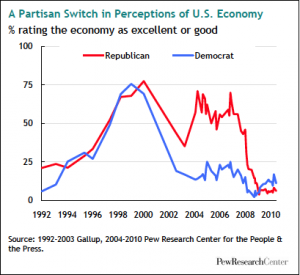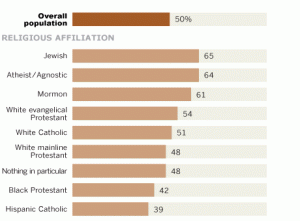What research results are showing up in the media?
Author Archives: mollie
PEW: Recession’s Impact
“Of the 13 recessions that the American public has endured since the Great Depression of 1929-33, none has presented a more punishing combination of length, breadth and depth than this one.
A new Pew Research survey finds that 30 months after it began, the Great Recession has led to a downsizing of Americans’ expectations about their retirements and their children’s future; a new frugality in their spending and borrowing habits; and a concern that it could take several years, at a minimum, for their house values and family finances to recover.”
Campaign Spending–Almost $3.7 billion so far
According to Open Secrets (http://www.opensecrets.org/news/2010/10/election-2010-to-shatter-spending-r.html), the Center for Responsive Politics conservatively estimates that “the current election cycle will cost $3.7 billion, reaffirming an initial cost-of-election prediction from earlier this year. The Center now forecasts, however, that final spending numbers for the full cycle will likely flirt with the $4 billion mark.
Continue reading
PEW: What are current global attitudes about climate change?
Our international polling shows that publics around the world are concerned about climate change. In the recent spring 2010 Pew Global Attitudes survey, majorities in all 22 nations polled rate global climate change a serious problem, and majorities in ten countries say it is a very serious problem.
There are some interesting differences among the countries included in the survey. Brazilians are the most concerned about this issue: 85% consider it a very serious problem. Worries are less intense, however, in the two countries that emit the most carbon dioxide — only 41% of Chinese and 37% of American respondents characterize climate change as a very serious challenge. Continue reading
Elections in Washington State
All political eyes are focused on the U.S. Senate Race here in Washington state. Will 3-term Patty Murray–a Democrat–be beaten by the two-time Gubernatorial loser Republican Dino Rossi?
Friday, October 08, 2010– www.rasmussenreports.com leads with this header:
Washington Senate: Rossi (R) Inches Ahead of Murray (D)
First line: Republican challenger Dino Rossi has edged slightly ahead of incumbent Democrat Patty Murray in Washington’s U.S. Senate race.
They provide their data:
A new Rasmussen Reports telephone survey of Likely Voters in Washington shows Rossi with 49% of the vote, while Murray’s support stands at 46%. Three percent (3%) prefer some other candidate in the race, and two percent (2%) are undecided.
Unfortunately, their poll has a 4 percent margin of error. This means that there needs to be more than a 4 percent difference in order to draw a statistically sound conclusion that one is actually ahead (and there is still a 5% chance of being wrong). These polling results are too close to call–and that is what should have been reported if Rasmussen were being honest about this. Continue reading
U.S. Religious Knowledge Survey–from PEW
Executive Summary
Atheists and agnostics, Jews and Mormons are among the highest-scoring groups on a new survey of religious knowledge, outperforming evangelical Protestants, mainline Protestants and Catholics on questions about the core teachings, history and leading figures of major world religions. Continue reading
October Open Thread
Research in the News? What interests you?
Surprising Perceptions About Income Distribution
A new study based on perceptions of over 5,000 people shows views about income distibution that contradict the belief that people are OK with income inequities.
“All demographic groups — even those not usually associated with wealth redistribution such as Republicans and the wealthy — desired a more equal distribution of wealth than the status quo.” Continue reading
More Americans are Poor than Ever Before, Census Finds
Available data can tell a story. As the economy continues its downward trend, poverty is increasing, as is demand for programs to help people who now need a safety net–like food stamps, unemployment insurance and health insurance for their kids.
Since the programs intended to fight poverty were implemented in the 1960s, there have been critics who questioned whether the anti-poverty programs were effective. While not sufficient to reverse the deleterious effects of an impaired economy, it does appears that they are helping a substantial number of people stay above the poverty line. Of course, that line is set pretty low for many urban areas–so many people are worse off economically than the numbers show. Continue reading
Explaining the Declining Crime Rate
Economists Donohue and Levitt (2001) claim that legalizing abortions explains the drop in crime rates, reasoning that legalization allowed women to avoid childbirth until they were in a position to care for their children. The underlying assumption is that unwanted babies growing up with mothers who are not ready to care for them are likely to become violent criminals. This assumption, however, is just an assumption; the authors do not provide evidence to support it. The political spin here is that if there is a relationship between abortions and crime reduction, those who support a woman’s right to choose might argue that restricting access to abortions would have an unintended consequence of increasing future crime rates. Continue reading



